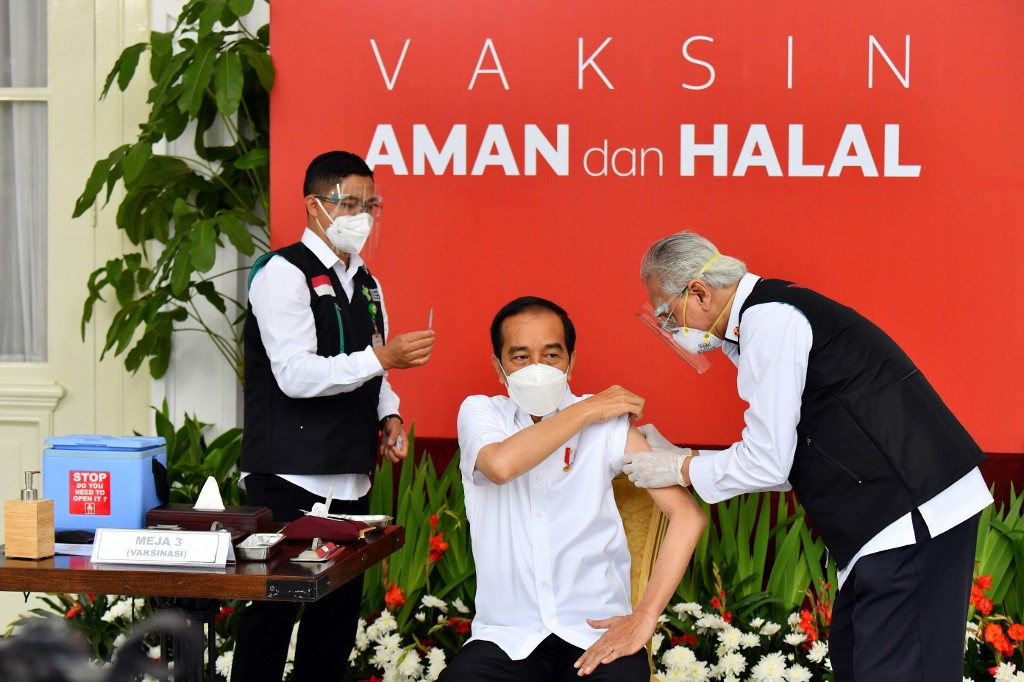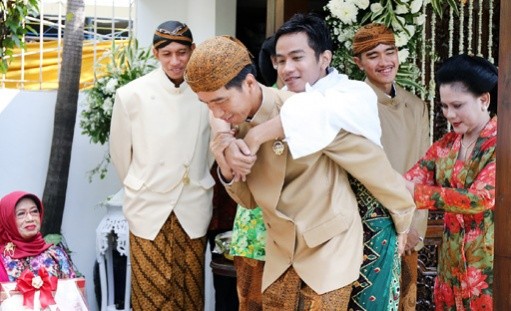Popular Reads
Top Results
Can't find what you're looking for?
View all search resultsPopular Reads
Top Results
Can't find what you're looking for?
View all search results‘Good days’ fi nd outsize role in Jokowi’s Javanese leadership style
The President has not hidden the fact that he has been inspired by ancient Javanese teachings, as is the case in his use of auspicious days for policy making.
Change text size
Gift Premium Articles
to Anyone
Lately, Wednesdays seem to have taken on more meaning than the simple mid-week hump.
President Joko “Jokowi” Widodo has had a tendency to announce and enact important government policies on that day of the week, and some say it’s not a coincidence.
Most recently, the Javanese leader chose last Wednesday to become the first person in the country to receive a COVID-19 vaccination during the launch a mass campaign seeking to inoculate 181.5 million Indonesians, some 70 percent of the population, against the disease within 18 months (but ideally in under a year).
The event was heavily orchestrated and broadcast live from the Presidential Palace for all to see.
On the same day, Jokowi sent State Secretary Pratikno to the House of Representatives to deliver a letter officially nominating the head of the National Police’s Criminal Investigation Department (Bareskrim), Comr. Gen. Listyo Sigit Prabowo, as the sole candidate for the next chief of police.
Listyo has been a close acquaintance of the President since his days as chief of the Surakarta Police in Central Java, where Jokowi’s political career flourished.
Read also: 'Lamun sira sekti, aja mateni': Jokowi infuses Javanese philosophy into politics
The President has not shied away from traditional Javanese teachings, but speculation about his tendency to make important moves on Wednesdays resumed after senior National Awakening Party (PKB) politician Jazilul Fawaid predicted that the President would reshuffle his cabinet on Dec. 23 because it coincided with Wednesday Pon, a Javanese “good day” for Jokowi.
Jazilul’s comment was in reference to the Javanese tradition of weton, which is a method of predicting fortunes based on combinations of the seven-day Gregorian calendar week and the five-day Javanese calendar week, consisting of Pon, Wage, Kliwon, Legi and Pahing.
Jazilul’s prediction was at least partially true; Jokowi did announce the first reshuffle of his Indonesia Onward Cabinet on Tuesday, Dec. 21. He inaugurated the six new Cabinet ministers the following day.
Observers say Jokowi's leadership style has been deeply influenced by Javanese philosophy and tradition and that the reshuffle was just one instance of Jokowi showcasing his belief in the tradition of auspicious days.
Aris Arif Mundayat, a sociologist at Sebelas Maret State University, said that many Javanese people believe the day they were born represents their personal “good day” and tend to mark that combination of days in the Javanese and Gregorian calendars with certain cultural and spiritual rituals, such as fasting.
Jokowi’s tendency to use Wednesdays in this fashion pointed to such thinking, Aris suggested.
“It could be that [Jokowi] believes that Wednesday is the day he was born and that it was the day that brought him into this world safely and eventually led him to become a leader. This means that Wednesday is a ‘good day’ for him,” Aris told The Jakarta Post on Friday.
Likewise, Indonesian Institute of Sciences (LIPI) political researcher Wasisto Raharjo Jati, who has a special interest in Javanese philosophy, believed Jokowi had based his decisions on weton.
“In the Javanese calendar, the weton day is a special day [...] and plays an influential role in deliberations to make certain decisions,” Wasisto said recently.
Jokowi was born on June 21, 1961, which was a Wednesday Pon.
Read also: Seeking good day for President's son's wedding
It was not the first time that Jokowi’s gestures were interpreted through the lens of Javanese thought.
In the midst of the political party horse trading in the aftermath of the 2019 general election, Jokowi posted a short video on his official Instagram and Twitter accounts on July 20, 2019, that contained the Javanese phrase lamun sira sekti, aja mateni.
This roughly translates to, “Even though you are powerful, do not knock others down.” The message spurred a flurry of interpretations as the then-President-elect sought to consolidate political alliances after his victory.
President Joko “Jokowi” Widodo carries his eldest son Gibran Rakabuming Raka in Surakarta, on June 10, 2015, during siraman, a Javanese traditional bathing ceremony that signifies an act of purification ahead of one’s wedding day. Gibran is marrying the local 2009 beauty queen, Selvi Ananda Putri, on June 11, 2015.. (Courtesy of Wedding Media Center/-)On the day that Jokowi revealed his Cabinet that October, he welcomed Gerindra Party patron Prabowo Subianto, his rival in both the 2014 and 2019 presidential elections, into the fold as Defense Minister.
Over a year later, on Dec. 23, 2020, Jokowi and Vice President Ma'ruf Amin tapped businessman-turned-politician Sandiaga Uno, who was Prabowo’s running mate in the 2019 election, as the new Tourism and Creative Economy Minister – reuniting all of the participants in the last election in his Cabinet.
Read also: Mysticism shrouded Soeharto's life, death
Aris said the move to invite former rivals into the Cabinet exemplified Jokowi’s desire to avoid a “twin sun” scenario, where multiple figures competed for power and influence, to avoid further polarizing public sentiment, which had been split between extremes of support for Jokowi and Prabowo.
Some critics say that President Jokowi has fashioned himself as a Javanese prince of sorts, but in Muslim-majority Indonesia, he is one of many leaders that have employed ancient teachings in their governing style.
Former president Soeharto, who ruled the nation with an iron fist for 32 years, was known for his quest for power through spiritual exercises, which included meditation inside caves and regular visits to the graves of past Javanese leaders.











